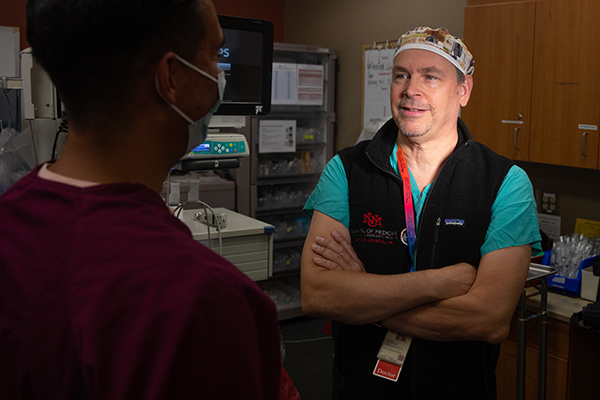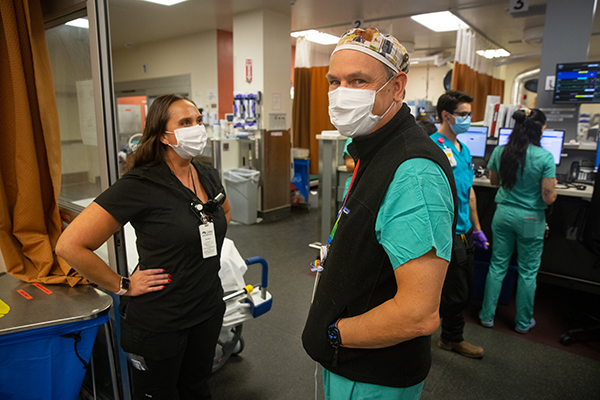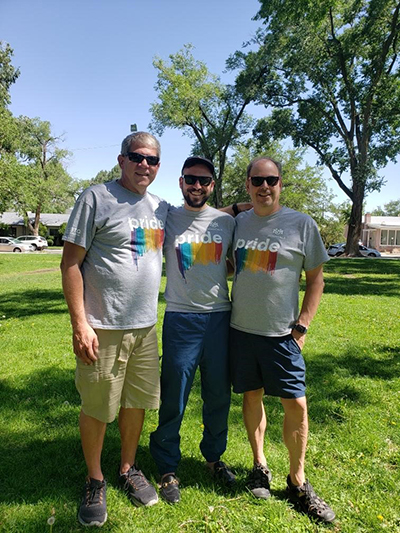
Cameron Crandall, MD, is dedicated to making institutional changes on behalf of the LGBTQ community because he wants to help others – starting in their doctor’s office.
“I don't really like to talk about myself,” he says. “I'd prefer to actually toil around the background and to make others successful. It's about serving our communities and giving everybody the opportunity to be successful.”
Crandall, who is gay, is the associate vice chancellor for LGBTQ Diversity, Equity & Inclusion in the UNM Health Sciences Office for Diversity, Equity & Inclusion, as well as vice chair for Research in the Department of Emergency Medicine. He also is a Regents' Professor in the Department of Emergency Medicine.
I'd prefer to actually toil around the background and to make others successful. It's about serving our communities and giving everybody the opportunity to be successful.
Crandall grew up in Seattle, attended the University of Washington and went on to study public health at Johns Hopkins University. He arrived in New Mexico in 1993 to train in emergency medicine, joined the faculty in 1996 and has been here ever since.
The role of associate vice chancellor for LGBTQ Diversity, Equity & Inclusion is unique not only in New Mexico but throughout the country, he says.
“There are... occasional physician champions or faculty champions in a number of different schools, but to have someone dedicated to addressing these issues I think is really unique, and I have to thank the leadership for having the foresight and the commitment to doing this,” Crandall says.
The administrator role allows Crandall to use his skills in public health research to examine health care disparities and LGBTQ health.
“A number of groups experience health care disparities and a large part of this work is to focus and work on addressing some of those issues from a systemic lens, rather than a one-on-one encounter,” he says. “It's important to do both, right? In the emergency department I provide direct care to patients, but it's also really important to recognize that you could also potentially do even greater good by making systemic changes by looking at our systemic patterns.”
Crandall also is faculty advisor and liaison for UNM LGBTQ Students and Allies in Healthcare (LSAH), a group dedicated to advancing the health of lesbian, gay, bisexual, transgender and queer people through community outreach, curriculum intervention, provider education and mentoring.
Under Crandall’s guidance, LSAH has worked to update the UNM School of Medicine curriculum so that future physicians and other providers are trained to ask more questions about a person when they come in for health care. LSAH is now working on bringing that throughout UNM Health Sciences to raise awareness and supply tools to address and recognize health care disparities among sexual and gender minorities.
LSAH created the curriculum using guidelines set by the Association of American Medical Colleges.
“After taking an inventory of the curriculum, we identified a number of different points of potential intervention and improvement in the curriculum,” Crandall says. The School of Medicine now has “a full curricular vision and map that identifies probably about 20 different points of intervention.”
Crandall says the group created the questions so that they don’t make assumptions about a person's sexual identity or sexual practices.
“If individuals are engaging in a particular form of sexual practice that might expose them to a risk, it's important to educate the patients on what those risks are and help them manage those risks,” he says.
“If you assume somebody is married, that it's a male and they're married to a woman, you shouldn't assume that the individual identifies as straight. They may actually have more than one partner. They may have sex with men or multiple partners. It's important to really delve beyond identity and really talk about sexual practices and behaviors.”
In addition to making impactful changes within education, Crandall also led the way in revamping the electronic health record within the UNM Health System.
“Early in my tenure of taking this position, there was an awareness about the substantial health care disparities that transgender and gender nonconforming or gender nonbinary individuals experience in . . . health systems,” he says.
That led to significant changes in rethinking and ultimately, revamping, the electronic health record to incorporate expanded notions of sexuality and gender, Crandall says. “We changed our basic core demographics, and we now allow individuals to tell us their sexual orientation, their gender identity.”
He’s also led efforts in developing and offering more classes for students and has found that teachers are learning along the way.
“And in some sense, I could even say it's a bit of a misguided effort in this way,” he says. “Our learners are more progressively minded and are much more aware of these issues than our teachers have been in many cases.
 “Sometimes what we really need to do is provide the tools to our teachers, because folks who are younger, in large, take variations in sexuality and gender for granted. And it's not as disconcerting or unusual for our learner age groups but when we have our teachers, oftentimes they struggle with the concepts. In that sense, it's not hard to teach the learners. They understand the material, they are hungry for more. They want more details, they want more specifics.”
“Sometimes what we really need to do is provide the tools to our teachers, because folks who are younger, in large, take variations in sexuality and gender for granted. And it's not as disconcerting or unusual for our learner age groups but when we have our teachers, oftentimes they struggle with the concepts. In that sense, it's not hard to teach the learners. They understand the material, they are hungry for more. They want more details, they want more specifics.”
In the not-too-distant future, Crandall would like to see UNM Health establish surgical services for transexual patients.
“We know New Mexico offers very few surgical services specific for trans patients,” he says. “I bring that forward, because in order to teach about those topics and people to learn about those topics you really need to be doing it. You can talk about neurosurgery, but if you don't have a neurosurgeon, you're not going to learn much about surgery. So, if you're not doing some of these procedures and have the patients and the skill set to work around these patients, from a multidisciplinary model, it really falls flat.”
He also envisions UNM changing how it collects personal information, so that identifying sexuality and gender minority status is part of the process for applicants, whether it’s for students, staff or faculty.
“We need to do it because we'll use that information to ensure that we're doing the best we can for all of our groups of students and communities,” he says.
UNM Health Sciences and Services Building, First Floor
MSC09 5235
2500 Marble Ave. NE
1 University of New Mexico
Albuquerque, NM 87131
505-272-2728
HSC-Diversity@salud.unm.edu